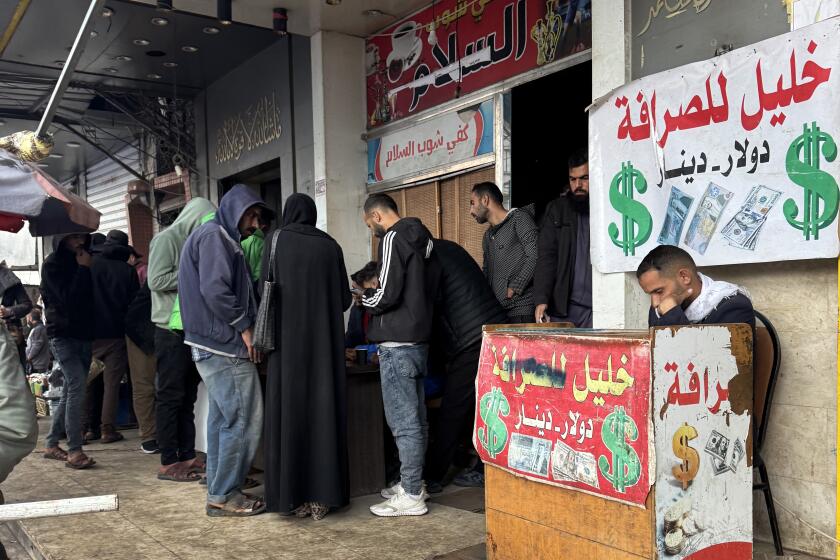PERSPECTIVE ON ARMENIA : Tribal Animosities Put Millions in Peril : Warfare cuts supply lines for millions; the United States is prevented by law from helping refugees on both sides.
- Share via
The recent upsurge of fighting between Armenian and Azeri forces in and around Nagorno-Karabakh has placed in grave jeopardy the ability of the United States and other donors to provide emergency humanitarian assistance to the Republic of Armenia. Unless this dispute is resolved, landlocked Armenia may be accessible only by air.
Armenia has emerged from its third successive disastrous winter. During the winter of 1992-93, severe shortages in fuel, food and medicines caused hardships that few Americans can imagine. For long stretches of the winter, Armenians were without heat and lights. Were it not for U.S. relief supplies and Turkish deliveries of wheat, tens of thousands of Armenians--mainly the very young and the very old--would surely have perished.
Armenia is bordered by Azerbaijan, Iran, Turkey and Georgia. The Azeris, fighting to maintain control over the largely Armenian district of Nagorno-Karabakh, have closed their border with Armenia, which they accuse of supporting ethnic Armenian rebels in Nagorno-Karabakh. Iran can’t offer much help to Armenia because of poor surface access and the predominance of ethnic Azeris in northern Iran. Turkey suspended all humanitarian shipments crossing its territory to Armenia in response to the recent fighting.
Georgia has recently been the key to large U.S. relief shipments to Armenia. Since December, 66,000 metric tons of grant U.S. wheat for Armenia has flowed through Georgian ports. More shipments are on the way.
As a result of the cooperation of the Georgian government, the war for Nagorno-Karabakh regrettably is spreading to Georgia itself. Three times during the past winter, ethnic Azeri residents of Georgia blew up the only natural gas line still servicing Armenia. In March, they sabotaged the only rail line connecting Armenia to Georgia’s Black Sea ports.
Ironically, as ethnic Armenians from Nagorno-Karabakh successfully carry the war into other sectors of Azerbaijan, opening up new supply corridors from Armenia into Nagorno-Karabakh, they contribute to the isolation of Armenia itself.
Yet all Armenians and supporters of Armenia still count on the United States to find ways to keep Armenia alive, even to the extent of spending more than $500,000 to ship 350 tons of flour by air last November when Yerevan’s bakeries were suddenly empty. When the United States spent more than $1 million to fly two Air Force C-5As to Yerevan, packed with 12,000 kerosene space heaters purchased in Korea by the United Armenian Fund, it was more of the same. The Americans, or so it seems, will always get through.
The truth of the matter is that without a reliable land corridor for outside assistance, 3.6 million Armenians are in grave peril. For most of 1992, until its single rail line into Armenia became clogged with wheat, Turkey was the principal conduit of U.S. humanitarian aid to Armenia. Fortunately, we switched to Georgia before Turkey, whose populace is largely pro-Azeri, cut Armenia off in response to the recent expansion of the war and the battlefield successes of the Nagorno-Karabakh Armenians. With Georgia now finding itself sucked into the tribal animosities of its neighbors, the noose tightens around Armenia.
Unless we can get the parties themselves to put an end to this madness, we will find it increasingly difficult to help Armenia. This is a logistical fact, not a political declaration.
War in the Transcaucasus has produced many victims, including some 500,000 Azeri refugees. In order to enhance the effectiveness of our diplomacy, we should be able to provide humanitarian assistance to Azerbaijan as well as Armenia. Yet Section 907 of the Freedom Support Act bans all U.S. assistance to the government of Azerbaijan, a terrible inconvenience when one realizes that virtually all hospitals, clinics and refugee-care facilities in Azerbaijan are still governmental in nature. I find it hard to believe that Congress, which has called for active U.S. diplomacy in the region, really intended to ban humanitarian aid for Azeri refugees. This legislative oversight needs to be corrected, and soon.
We want desperately to help Armenia and its neighbors enjoy the fruits of independence, but we won’t be able to do so effectively if the war continues. Unless it stops, continued needless suffering will be the only future for the citizens of Armenia and the residents of the Transcaucasus as a whole.
More to Read
Sign up for Essential California
The most important California stories and recommendations in your inbox every morning.
You may occasionally receive promotional content from the Los Angeles Times.










